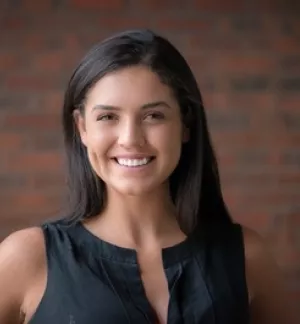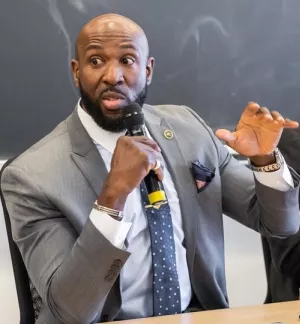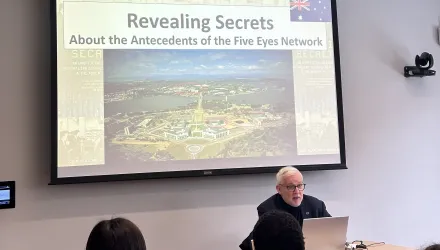
Conference Speakers Share Experiences with Diversity in IC
In the fall, more than 600 participants from across Harvard and the national security community convened for a two-day conference focused on building a more diverse and capable United States Intelligence Community (IC). Co-hosted by the Center’s Intelligence and Cyber Projects, the conference took place over two consecutive mornings and served as a kick-off to a year-long initiative focused on highlighting workforce diversity in the IC as a mission critical element to US national security.
Working from the premise that a diverse intelligence community is essential to national security, conference organizers Caitlin Chase, Jeff Fields, Paul Kolbe, Wayne Stone, and Lauren Zaberiek brought senior IC leadership and current and former intelligence practitioners together with experts and leaders from across private sector and academia to facilitate honest, open, and productive conversations and create greater understanding and awareness of opportunities and challenges that exist in the intelligence field for members of historically underrepresented groups.
The first day of the conference focused on identifying and understanding the current state of, opportunities, and issues surrounding diversity, inclusion, and belonging (DIB) in the IC, while the second day focused on developing and discussing innovative solutions to these issues.
"Diversity isn’t a nice to have, it’s a need to have.”
- Karen deLacy
During the conference, panelists and attendees shared their experiences and ideas on concrete policy and cultural changes to improve DIB in the IC for the benefit of national security. Speakers examined the historical record and experiences of underrepresented groups in the IC and compared strategies for recruiting, retaining, and developing a diverse workforce. The participants identified pathways for improving the diversity of thought in the IC, including how academia and the private sector could play a facilitating role. Panelists also reexamined the role of networking, mentorship, and leadership within national security organizations. The purpose of these conversations was to stimulate dialogue, spark creative new solutions, and inspire a diverse new generation to consider service in the intelligence community.
The ethos of the conference was captured by panelist Karen deLacy, former CIA officer and co-founder of deLacy Associates, who asserted that “Diversity isn’t a nice to have, it’s a need to have.” In the IC, where diverse opinions and skill sets are necessary to combat groupthink and generate alternative analyses, lack of diversity is a matter of national security. Building an intelligence community that is reflective of the myriad of backgrounds, experiences, and capabilities that make up the American public is mission critical to effective national security, akin to marksmanship and physical fitness in the military.
Despite rhetoric and an executive order to the contrary, the overarching consensus from conference participants was captured by Jeff Fields, who stressed that “this is not a political issue -- it is a capability issue."
“This is not a political issue -- it is a capability issue."
- Jeff Fields
Overall, the experiences shared by the panelists and attendees demonstrated great pride for the IC and dedication to the national security mission, but also frustration at lack of progress and continued barriers to recruitment and advancement. Most importantly, the participants came out of the conference with a shared passion, vision, and commitment, recognizing that in order to cultivate the organizational and cultural change necessary to ensure a competent, capable, and diverse IC, the community must first embrace that diversity is a mission essential component of national security, and that the IC benefits from varied voices and experiences at all levels and in all roles.
Follow-up Conference Note from Jeff Fields
An FBI Supervisory Special Agent within the National Security Division, Fields is a current Belfer Center Cyber and Intelligence Fellow
The response to the conference, across the IC, private sector, and academia has been incredible. After hearing the conference panelists and discourse, an NSA and an FBI analyst who had become disillusioned about the state of diversity told me they’ve become reinvigorated and have decided to rededicate themselves to the mission and to remain within the IC, and in addition, contribute to the necessary change to move the community and country forward.
On a personal note, I want to acknowledge the significance of this team creating room within an exclusive space for me to take part and contribute. Suffice it to say, when I first arrived at HKS a year ago, it was glaringly noticeable the lack of people who look like me or share my background throughout the school on staff or the faculty.
I will continue to pay it forward and create access and room to the spaces I’m privileged to navigate to further magnify the impact of your goodwill and support. I’m so very glad to know that this is only the beginning and I’m grateful and fortunate to be a part of it.
I appreciate your empowering generosity, your friendship, and more importantly, your partnership for this very important work - work to secure and preserve this admittedly flawed, but still amazing country that we love whose true potential we’ve only begun to scratch the surface of.
Click here to return to Belfer Center Newsletter
"Increasing Diversity in the Intelligence Community." Belfer Center Newsletter, Belfer Center for Science and International Affairs, Harvard Kennedy School. (Fall 2020)







